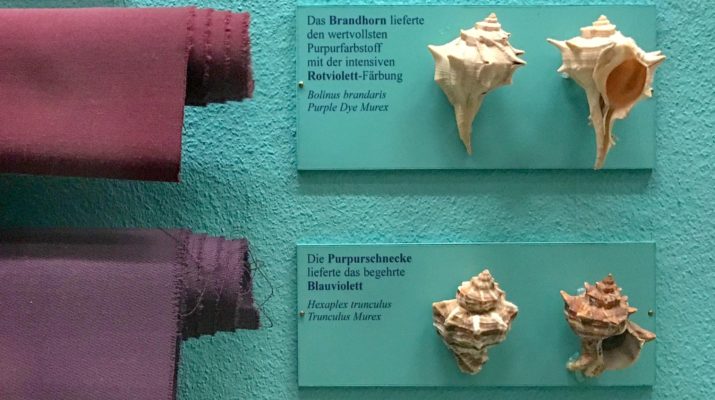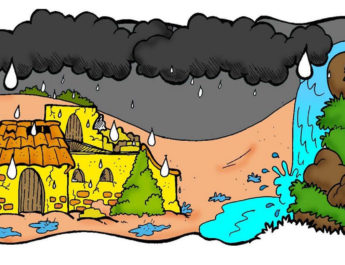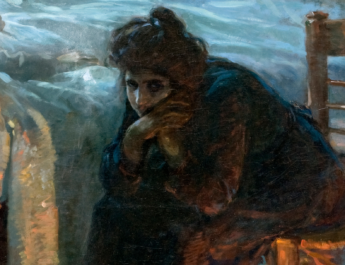Acts 16:9-15
Eastertide C26
9 During the night PaulA hadB a vision:C
A “Paul” = Paulos. From Latin Paulus (small, little). This is Paul or Paulos, meaning little.
B “had” = horao. Related to “vision” in v9. See note C below.
C “vision” = horama. 12x in NT. From horao (to see, perceive, attend to, look upon, experience; to stare at, which implies clear discernment; by extension, attending to what was seen and learned; to see, often with a metaphorical sense, which can include inward spiritual seeing). This is a sight, something seen, a vision. In the New Testament, it is always a supernatural vision.
there stoodD a manE of MacedoniaF pleadingG with him
D “stood” = histemi. This is to stand, place, establish, appoint, stand ready, be steadfast.
E “man” = aner. This is man, male, husband, or fellow. It can also refer to an individual.
F “Macedonia” = Makedon. 5x in NT. Perhaps from makednos (high or tall). This is Macedonian, perhaps meaning “the tall ones” or “highlanders.” See https://en.wiktionary.org/wiki/Macedonia
G “pleading” = parakaleo. From para (beside, by, in the presence of) + kaleo (to call by name, invite, to name, bid, summon, call aloud) {related to keleuo (to command, order, direct); from kelomai (to urge on)}. This is to call to, summon, invite, request, or beg. It can also be exhort or admonish. Also, this can be encourage, comfort, or console. This word has legal overtones and is used of one’s advocate in a courtroom. It is the root of the name of the Holy Spirit “paraclete” is our advocate and comforter.
and saying, “Come overH to MacedoniaI and helpJ us.”
H “come over” = diabaino. 3x in NT. From dia (through, for the sake of, across, thoroughly) + baino (to walk, to go). This is to pass through or step across.
I “Macedonia” = Makedonia. Related to “Macedonia” in v9. From makednos (see note F above). This is Macedonia, perhaps meaning “the tall ones” or “highlanders.” See https://en.wiktionary.org/wiki/Macedonia
J “help” = boetheo. 8x in NT. From boethos (helping or helper; one meeting urgent need); perhaps from boe (to cry, shout for aid; mimics the sound of a desperate shout for help with deep emotion); {from boao (cry out, make a distress call, ask for desperately need assistance); from boe (a cry, shout)} + theo (to run). This is running to help someone who has made an urgent call for help – coming to their rescue. Originally, this was used in a military context, but came to apply more generally to assistance in time of intense distress.
10 When he had seenK the vision, we immediatelyL triedM to cross overN to Macedonia,O
K “seen” = horao. Same as “had” in v9. See note B above.
L “immediately” = eutheos. From euthus (immediately, upright, straight and not crooked); {perhaps from eu (good, well, well done, rightly) + tithemi (to place, lay, set, establish)}. This is directly, soon, at once.
M “tried” = zeteo. This is to seek, search for, desire. It is searching for something by inquiring or investigation. It can be seek in a literal or figurative sense. There is a Hebrew figure of speech “to seek God’s face” so it can also mean to worship God. Alternately, you could seek someone’s life i.e. plot to kill them.
N “cross over” = exerchomai. From ek (from, from out of) + erchomai (to come, go). This is to go out, depart, escape, proceed from, spread news abroad.
O “Macedonia” = Makedonia. Same as “Macedonia” in v9. See note I above.
being convincedP that GodQ had calledR us to proclaim the good newsS to them.
P “convinced” = sumbibazo. Related to “come over” in v9. 7x in NT. From sun (with, together with) + the same as basis (foot, step, pace) {from baino (se note H above)} OR sun (with, together with) + bibazo (to force ){from the same as basis (see above)}. This is joining together, considering, uniting, concluding, proving, or teaching. It is building reasoning – working through the steps to grasp truth by weaving ideas together to form a judgment or a conclusion. By extension, it is applying that understanding to showing or teaching.
Q “God” = Theos. From Proto-Indo-European origins, meaning do, put, place. This is God or a god in general.
R “called” = proskaleo. Related to “pleading” in v9. From pros (at, to, toward, with) + kaleo (see note G above). This is to call to oneself, summon.
S “proclaim the good news” = euaggelizo. Related to “immediately” in v10. From eu (see note L above) + aggelos (angel, messenger; a messenger from God bringing news – whether a prophet or an angel) {from aggellos (to bring tidings); probably from ago (to bring, lead, carry, guide)}. This is evangelize – literally to preach the good news. It can be those who hear the news, the news, or a way to say gospel.
11 We set sailT from TroasU and took a straight courseV to Samothrace,W the following day to Neapolis,X
T “set sail” = anago. Related to “proclaim the good news” in v10. From ana (up, again, back, among, anew) + ago (see note S above). This is to lead up, offer, set sail, bring out, depart, loose.
U “Troas” = Troas. 6x in NT. From Troias (Trojan); from Tros (Troy). This is Troas, a city in Troy’s plain. See https://en.wiktionary.org/wiki/%CE%A4%CF%81%CF%89%CE%AC%CF%82#Ancient_Greek
V “took a straight course” = euthudromeo. Related to “immediately” and “proclaim the good news” in v10. 2x in NT. From euthus (see note L above) + dromos (a course, track, career, race); {from dramein (to run) or from trecho (to run, make progress, rush; running like an athlete in a race; figuratively, to work quickly towards a goal in a focused way)}. This is to run or sail in a direct or straight trajectory.
W “Samothrace” = Samothrake. 1x in NT. From Samos (Samos); {from samos (“seaside hill, dune, height”); from Phoenician sama (high)} + Thrake (Thrace); {from Thraix (Thracian); from thrasso (to stir, trouble)}. This is Samothrace, meaning Samos of Thrace. See https://en.wiktionary.org/wiki/%CE%A3%CE%B1%CE%BC%CE%BF%CE%B8%CF%81%E1%BE%B4%CE%BA%CE%B7#Ancient_Greek
X “Neapolis” = Neos + Polis. Neos is young, new, fresh, or youthful. This is brand new as opposed to novel (which is kainos in Greek). Polis is a city or its inhabitants. It is a town of variable size, but one that has walls. This is where “metropolis” and “police” come from.
12 and from there to Philippi,Y which is a leadingZ cityAA
Y “Philippi” = Philippoi. 4x in NT. From Philippos (Philip, meaning one who loves horses or is fond of horses); {from philos (dear, beloved, a friend, an associate; friendship with personal affection, a trusted confidante; love from personal experience with another person) + hippos (horse)}. This is Philippi, a city in Macedonia.
Z “leading” = protos. From pro (before, first, in front of, earlier). This is what is first, which could be the most important, the first in order, the main one, the chief.
AA “city” = polis. Same as “Neapolis” in v11. See note X above.
of the districtBB of MacedoniaCC and a Roman colony.DD We remainedEE in this city for some days.FF
BB “district” = meris. From meros (a part or share, portion); from meiromai (to get one’s allotment or portion). This is portion, share, district. It can be literal or figurative.
CC “Macedonia” = Makedonia. Same as “Macedonia” in v9. See note I above.
DD “colony” = kolonia. 1x in NT. From Latin colonia (settlement, colonist); from colonus (farmer, colonist); from colo (“till, cultivate, worship”). This is a colony, citizen, city that has a garrison in it. It is where the word “colony” comes from. See https://en.wiktionary.org/wiki/colonia#Latin
EE “remained” = diatribo. 9x in NT. From dia (through, for the sake of, across, thoroughly) + the same as tribos (worn track or path like a rut that is formed from rubbing i.e. steady use; also road or highway); {from tribo (to rub or thresh)}. This is to spend time, remain, stay, continue. Literally, it is to rub or wear away.
FF “days” = hemera. Perhaps from hemai (to sit). This is day, time, or daybreak.
13 On the sabbathGG day we wentHH outside the gateII by the river,JJ
GG “sabbath” = sabbaton. From Hebrew shabbath (sabbath); from shabath (to rest, stop, repose, cease working; by implication, to celebrate). This is the sabbath. It can also be used as shorthand for a week i.e. the time between two sabbaths.
HH “went” = exerchomai. Same as “cross over” in v10. See note N above.
II “gate” = pule. 10x in NT. This is gate, large entrance to a city or a fortress. It is often used for an exit way. Figuratively, it can refer to authority and power.
JJ “river” = potamos. 17x in NT. From pino (to drink). This is a river, brook, or water. It can also be a riverbed flowing with heavy rain or melted snow (like an arroyo).
where we supposedKK there was a place of prayer;LL and we sat downMM and spoke to the womenNN who had gatheredOO there.
KK “supposed” = nomizo. 15x in NT. From nomos (what is assigned – usage, law, custom, principle; used for the law in general or of God’s law; sometimes used to refer to the first five books of the Bible or the entire Old Testament; also used to refer to theology or the practice and tradition of interpreting and implementing the law of God); from nemo (to parcel out, assign). This is to practice, think, consider, suppose, hold by custom. This is thinking that something applies given precedent and practice – to do by law.
LL “prayer” = proseuche. From proseuchomai (to pray or pray for, to worship or supplicate; more literally exchanging one’s own wishes for God’s); {from pros (advantageous for, at, toward) + euchomai (to wish, make a request, pray)}. This is prayer, worship, or a place where one prays.
MM “sat down” = kathizo. From kathezomai (to sit down, be seated); {from kata (down, against, according to, among) + hezomai (to sit); {from aphedron (a seat, a base)}}. This is to sit, set, appoint, stay, rest.
NN “women” = gune. Perhaps from ginomai (to come into being, to happen, become, be born; to emerge from one state or condition to another; this is coming into being with the sense of movement or growth). This is woman, wife, or bride. This is where the word “gynecologist” comes from.
OO “gathered” = sunerchomai. Related to “cross over” in v10. From sun (with, together with) + erchomai (see note N above). This is to go with, assemble, leave together with, cohabit.
14 A certain woman namedPP Lydia,QQ a worshiperRR of God, was listeningSS to us; she was from the city of ThyatiraTT and a dealer in purple cloth.UU
PP “named” = onoma. May be from ginosko (know, recognize, learn from firsthand experience). This is a name, authority, cause, character, fame, reputation. The name was thought to include something of the essence of the person so it was not thought to be separate from the person.
QQ “Lydia” = Ludia. 2x in NT. From Ludos (the name Lydus); {from Ludia (a region); from ludia (beautiful, noble); Ludos (a king)} or from Hebrew Lod (Lod, a town). This is Lydia, meaning “from Lud” or “from Lydia” or “from the bender” or “from the almond tree.” See https://en.wiktionary.org/wiki/Lydia & https://www.abarim-publications.com/Meaning/Lydia.html
RR “worshiper” = sebo. 10x in NT. This is to worship, revere, adore, be devout. Properly this is personally placing a high value on someone or something, showing respect.
SS “listening” = akouo. This is hear or listen, but it also means to understand by hearing. This is where the word “acoustics” comes from.
TT “Thyatira” = Thuateira. 4x in NT. From Lydian (“castle of Thya”); {from dya (a name)}. This is Thyatira. See https://en.wiktionary.org/wiki/%CE%98%CF%85%CE%AC%CF%84%CE%B5%CE%B9%CF%81%CE%B1#Ancient_Greek
UU “dealer in purple cloth” = porphuropolis. 1x in NT. From porphura (purple dye, cloth, or a garment from that cloth; ranged from violet to scarlet to blue; dye made from a snail; symbolized royalty, wealth, or power); {perhaps from phuro (to mix something dry with something wet)} + poleo (to barter or sell; the thing that is sold); {from pelomai (to be busy, trade)}}. This is someone who sells purple fabric.
The LordVV openedWW her heartXX to listen eagerlyYY to what was said by Paul.
VV “Lord” = Kurios. From kuros (authority, supremacy). This is a respectful address meaning master or sir. It refers to one who has control or power greater than one’s own. So, it was also applied to God and Jesus as Master or Lord.
WW “opened” = dianoigo. 8x in NT. From dia (through, because of, across, thoroughly) + anoigo (to open or open up in a literal or figurative sense; to speak freely); {from ana (up, back, again, among, between, anew) + oigo (to open)}. This is to open fully. It can mean to open the womb as a firstborn does or figuratively to explain or expound.
XX “heart” = kardia. Literally the heart, but figuratively mind, character, inner self, will, intention, thoughts, feelings. Also, the center of something. The word heart is only used figuratively in the Old and New Testaments. This is where “cardiac” comes from.
YY “listen eagerly” = prosecho. From pros (at, toward) + echo (have, hold, possess). This is have towards, which is to say to give something your complete attention, beware, be cautious, hold to, turn to.
15 When she and her householdZZ were baptized,AAA she urgedBBB us, saying, “If you have judgedCCC me to be faithfulDDD to the Lord,
ZZ “household” = oikos. This is house – the building, the household, the family, descendants, the temple.
AAA “baptized” = baptizo. From bapto (to dip or dye; to entirely cover with liquid, to stain). This is to submerge, wash, or immerse. Used specially for baptism.
BBB “urged” = parakaleo. Same as “pleading” in v9. See note G above.
CCC “judged” = krino. To judge, decide, think good, condemn, determine, pass judgment, stand trial, sue. This is judging whether it is done in court or in a private setting. Properly, it refers to mentally separating or distinguishing an issue – to come to a choice or decision, to judge positively or negatively in seeking what is right or wrong, who is innocent or guilty. It can imply trying, condemning, punishing, or avenging.
DDD “faithful” = pistos. From peitho (to have confidence, urge, be persuaded, agree, assure, believe, have confidence, trust). This is faithful, trustworthy, reliable, sure, or true. It is a fullness of faith. This is the same root as the word “faith” in Greek.
comeEEE and stayFFF at my home.”GGG And she prevailedHHH upon us.
EEE “come” = eiserchomai. Related to “cross over” in v10 & “gathered” in v13. From eis (to, into, for, among) + erchomai (see note N above). This is to go in in a literal or figurative sense.
FFF “stay” = meno. This is to stay, remain, wait, await, continue, abide, endure. It can mean to literally stay in a place or to remain in a condition or to continue with hope and expectation.
GGG “home” = oikos. Same as “household” in v15. See note ZZ above.
HHH “prevailed” = parabiazomai. 2x in NT. From para (by, beside) + biazo (to force, use power to seize); {from bia (strength, force, violence); or from bios (life, livelihood, goods, wealth)}. This is to urge, press, use powerful, persuasive words to accomplish a goal.
Image credit: “Purple Purpur (retouched)” by U.Name.Me & TeKaBe, 2018.




